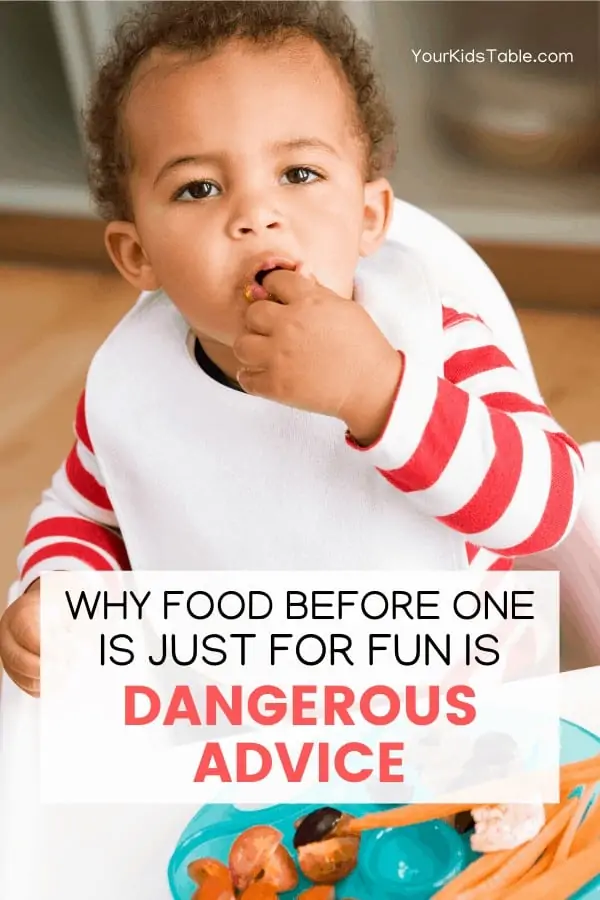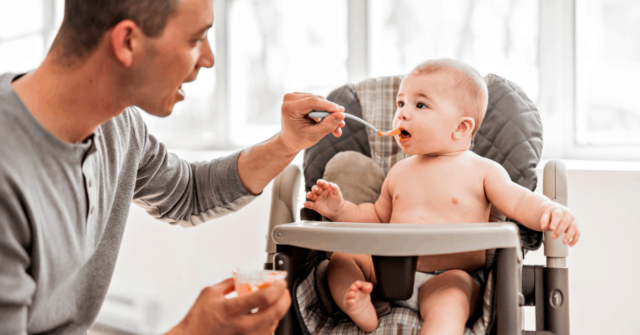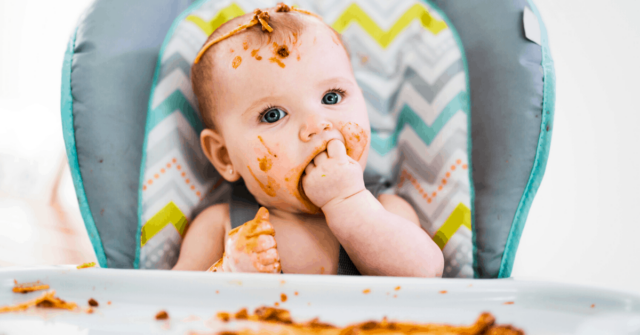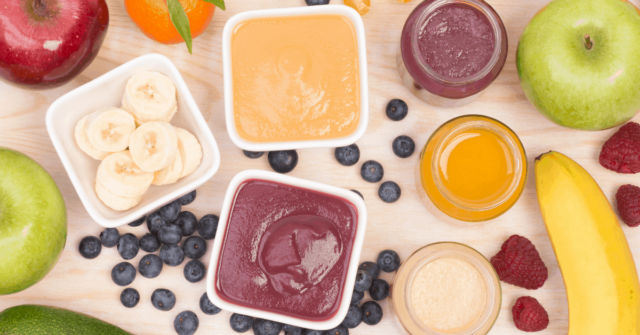Food before one is just for fun is popular advice for parents before their baby’s first birthday, but sometimes following that advice can do a lot more harm than good. Find out when you shouldn’t follow this sometimes dangerous advice!
Have you heard the adage: “Food before one is just for fun”? While it’s a catchy little phrase that definitely has some truth to it, as an occupational therapist, I’ve also seen it hurt some babies progress with eating.
Before you make food before one is just for fun your mantra, let’s talk about when your baby should be eating and why it matters if you follow this popular advice or not…
When Should Babies Start Eating?
Most babies start eating baby food around 5-6 months old. It’s a messy affair, or should be, as they learn to open their mouth for a spoon and keep their tongue in their mouth without accidentally shoving all the food back out.
Some babies won’t accept much more than a taste until around 7 to 7 and 1/2 months old.
Following a traditional feeding approach, a baby would start to eat solid table or finger foods around 8-9 months old. Those first foods usually include crackers, puffs, and yogurt melts.
Then by 10-12 months old, a baby, now young toddler, is eating a variety of table foods. From 12-14 months old, food becomes their primary source of nutrition, although it’s supported by milk or continued breast feedings.
If you’ve opted to go the Baby Led Weaning route, then your child could be eating table foods a lot closer to 7-8 months, as they’re often first introduced at 6 months. Check out the pro’s and con’s of BLW from a feeding therapist’s perspective.
See more feeding milestones for babies and toddlers.
How Much Should Babies Eat?
As babies begin eating baby foods, parents naturally become concerned with how much they’re eating. Those baby food jars are pretty big and it can feel like they aren’t eating much.
And, that’s okay. Some babies gobble down 2-3 jars of foods, but other’s may only eat a tablespoon or two of it. Breast milk or formula is their primary source of nutrition and the experience of eating is what’s important.
The same goes with table foods, as they begin, it’s often very little, just a couple of bites of food. As they approach 12 months old, this amount should increase closer to 3 tablespoons or so of table foods at a meal.
Babies Need to Play and Explore their Food
Babies are learning to eat and develop the skills they need to chew and safely swallow foods for the rest of their life. A big part of that learning is touching and playing with their food.
Food is totally foreign to them. While they’re beginning to watch you eat, they learn through exploring and interacting with food.
That often means mess and food dropped or thrown to the floor. As frustrating as that is, it’s normal. Even vital for their learning to eat.
The Truth of “Food Before One is Just for Fun”
That’s where the truth lies in “food before one is just for fun”. The focus shouldn’t be on how much they’re consuming or if they’ve had enough calories from the yogurt melts.
The focus should be on fun, exploration, and play with food as your baby learns to eat because they still have the breast milk/formula safe guard before 12 months old to provide them with all the nutrition they need.
The Danger of “Food Before One is Just for Fun”
The problem with this common advice is that some babies have a hard time learning to eat. No matter how much parents take the pressure off and try to focus on fun, their baby screams when they get in their high chair.
Or, they gag every time they touch or try to eat a new food.
Or, they spit all the food out of their mouth.
Or, they hold the food in their mouth (pocketing) and don’t swallow for a very long time.
If your baby is doing any of these things, it’s important to keep trying because with more exposure to foods, they may get over it. And, that’s one of the ways this advice can trip parents up, because they don’t try again.
Understandably so, parents get worried and think since food before one is just before one, they’ll wait till their older to try again.
But, waiting almost always deepens the challenges a baby is facing learning to eat.
Other times, parents may continue to try for months while the same gagging, refusing, and spitting continues with no progress and a lot of frustration and worry. They don’t seek out any help though because food before one is just for fun.
In either scenario, a baby isn’t learning to eat when it’s most critical. Yes, they can be taught at 14 or 18 months, but it’s a lot more involved at that point. The key is to recognize the red flags that your baby might need some help with learning to eat, which are:
- Gagging nearly every time they try to eat
- Consistently gagging after they’ve tried to chew their food
- Always totally refusing baby food or other pureed foods like yogurt and applesauce for several months
- Always totally refusing table foods for several weeks at 10 months old or older
- Spitting most or all of their food out of their mouth
- Pocketing or holding food in their mouth for long periods of time
- Always tantruming when they have to come to the table
If your baby has any of those red flags, you want to throw “food before one is just for fun” out the window and get proactive about helping your child overcome the difficulty their having with food.
How to Help the Baby That’s Having a Hard Time Learning to Eat
Sometimes babies just need a little bit of help and consistency. Eating is a skill just like talking and walking. It doesn’t always come natural because of other underlying difficulties. Join me live (or watch the replay) for a free mini lesson to learn 4 different reasons why babies and toddlers have difficulty eating.
Secondly, one of the best free resources I can put in your hands is our free printable: How to Transition Your Baby or Toddler to Table Foods.
It walks you through the steps I use as a feeding therapist to teach your child with some key beginning steps.
Of course getting a feeding evaluation and possible treatment may also be helpful in some cases. If you’ve got a question about your baby leave a comment below.
More on Feeding Babies
When Can Babies Eat Cheerios, Puffs, & Other Foods Safely – Answered!
The Complete Guide for Breastfed Babies that Refuse Bottles
Why Your Baby Should Be Putting Toys in Their Mouth
Alisha Grogan is a licensed occupational therapist and founder of Your Kid’s Table. She has over 15 years experience with expertise in sensory processing and feeding development in babies, toddlers, and children. Alisha also has 3 boys of her own at home. Learn more about her here.





Hi Alisha,
My 10 mo flat out refuses to be spoon fed so I turned to blw. Thing is she does not refuse any food put on the table. She literally takes 2 bites of anything or everything placed in front of her and then goes to smash everything and throws it around the house. There was a time she liked eating about a quarter of an avocado. Now she refuses even that. She barely gets like a tbsp worth of food in a day.
What do I do?
Regards
Deepika
Hi Deepika,
Thanks for reaching out! It can be really challenging when our little ones start refusing to eat. One thought is to start using a booster seat, highchair or designated spot to eat to reduce here moving around the house during mealtimes. Our free tablefoods workshop would also be really helpful to you. You can save your seat HERE. Please reach out with any questions!
Best,
Andrea
Hi my son is 9 months old and I am having problems getting him to eat anything. He closes his mouth and flat out refuses. He only puts his fingers or cloth comforter in his mouth voluntarily. I have started brushing his teeth. Is there anything else I can try.
Hi Bernadette,
That sounds really challenging! Toothbrushing is a great first step. Sometimes giving your little one control of the spoon and over exaggerating how to put the spoon in your mouth can be helpful. We have a free table foods workshop that might be helpful. You can save your seat HERE.
Best,
Andrea
Hi! My baby is 11 months old. He is breast/ bottle feeding. He will eat an entire teething cracker. And taste other foods when he feels like it. Other times he pushes our hand away. We let him play with food. Excellent growth & weight on breastmilk. Just getting concerned obviously
Hey Heather,
Thanks for reaching out!! So glad that he is eating some meltable (teething) crackers, this is a great first step. I would try to offer a variety of these meltable foods, as these are so helpful in moving forward. We do also have a free workshop that will be helpful for you with great strategies and tips for moving your baby onto table foods. You can save your seat HERE
Best,
Desiree